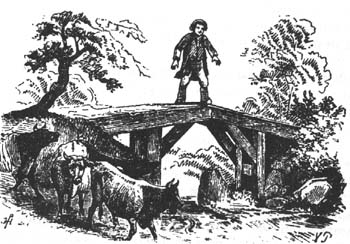Big Peter and Little Peter
 Pittsburgh professor D. L. Ashliman has assembled a terrific online collection of European folktales, including several versions of some stories for comparison. One that struck me on a recent visit was "Big Peter and Little Peter," a Norwegian trickster tale set down in 1859. Here's an extract of its heartless picture of sibling rivalry:
Pittsburgh professor D. L. Ashliman has assembled a terrific online collection of European folktales, including several versions of some stories for comparison. One that struck me on a recent visit was "Big Peter and Little Peter," a Norwegian trickster tale set down in 1859. Here's an extract of its heartless picture of sibling rivalry:But when [Big Peter] got home again he was not very gentle; he swore and cursed, threatening to strike Little Peter dead that very night. Little Peter stood and listened to all this. After he had gone to bed with his mother, and the night had worn on a little, he asked her to change sides with him, saying that he was cold and that it would be warmer next to the wall. Yes, she did that, and a little later Big Peter came with an ax in his hand, crept up to the bedside, and with one blow chopped off his mother's head.
For folklorists, "Big Peter and Little Peter" is an example of Aarne-Thompson type 1535. For more literary types like myself, it's interesting to see how Hans Christian Andersen cleaned up the story as "Little Claus and Big Claus": the mother became a grandmother who was already dead, so only her corpse got mutilated. No nightmares for children there! In another episode of the same story, Andersen changed an implicitly libidinous priest into a merely ugly sexton, thus avoiding another type of awkwardness.
The next morning, Little Peter went into Big Peter's room.
"Heaven help you," he said. "You have chopped our mother's head off. The sheriff will not be pleased to hear that you are paying mother's pension in this way."
Then Big Peter became terribly frightened, and he begged Little Peter, for God's sake, to say nothing about what he knew. If he would only keep still, he should have eight hundred dollars.
Well, Little Peter swept up the money; set his mother's head on her body again; put her on a sled, and pulled her to market. There he set her up with an apple basket on each arm, and an apple in each hand. By and by a skipper came walking along; he thought she was a market woman, and asked if she had apples to sell, and how many he might have for a penny. But the old woman did not answer. So the skipper asked again. No! She said nothing.
"How many may I have for a penny?" he cried the third time, but the old woman sat there, as though she neither saw nor heard him. Then the skipper flew into a rage and slapped her, causing her head to roll across the marketplace. At that moment, Little Peter came running. Weeping and wailing, and threatened to make trouble for the skipper, for having killed his old mother.
"Dear friend, keep still about what you know," said the skipper, "and I'll give you eight hundred dollars," and thus they made a deal.
When Little Peter got home again, he said to Big Peter, "Old women were bringing a good price at the market today; I got eight hundred dollars for our mother," and he showed him the money.
"It is good that I came to know this," said Big Peter. He had an old mother-in-law, and he killed her, and then set forth to sell her. But when people heard how he was trying to sell dead bodies, they wanted to hand him over to the sheriff, and it was all he could do to escape.


1 comment:
Cost of doing away with mother-in-law: priceless.
Post a Comment